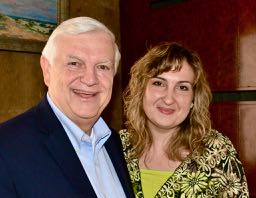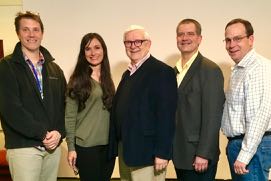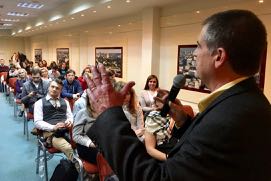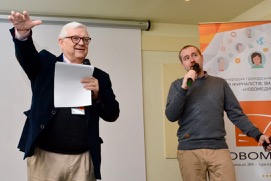How do you manage yourself?
 Do you consider yourself a manager? An executive? We often times find ourselves managing businesses, ministries, and, mostly, other people. But what about managing yourself?
Do you consider yourself a manager? An executive? We often times find ourselves managing businesses, ministries, and, mostly, other people. But what about managing yourself?
The name Peter Drucker is synonymous with management. He was an expert who wrote the classic book, The Effective Executive. Drucker says,
[blockquote author="Peter Drucker" link="" target="_blank"]…executives who do not manage themselves for effectiveness cannot possibly expect to manage their associates and subordinates.[/blockquote]
He writes that effectiveness is the key. Intelligence, knowledge, and imagination, are important. But it is effectiveness that converts them into results.
The good news? Effectiveness can be learned. Drucker lays out five practices, habits of the mind, that have to be acquired for a leader to be an effective executive. Here is a synopsis of his list.
1. Effective executives know where their time goes. Everyone demands time from the executive, so it is essential that the leader bring his time under control.
2. Effective executives focus on outward contributions…gearing their efforts toward results rather than to just work.
3. Effective executives build on strengths…their strengths, the strengths of their superiors, colleagues, and even on the situation.
4. Effective executives concentrate on the few major areas where superior performance will produce outstanding results.
5. Effective executives make effective decisions. Not a lot of quick decisions, but the few, fundamental ones.
(The Effective Executive, Peter F. Drucker, Harper & Row, Publishers, 1966)
Of course, there is much more, but even this brief summary can propel you to a more effective leadership style, and ultimately to a more effective ministry.
[blockquote author="II Timothy 2:15 MSG" link="" target="_blank"]Concentrate on doing your best for God, work you won’t be ashamed of, laying out the truth plain and simple.[/blockquote]
Worth the Whole World
 Over the past few weeks I have tried to write this newsletter, without results. It wasn’t for a lack of need for prayer for those who serve the Lord through Christian media. Call it writer's block, busyness, the urgent pushing out the important. It’s probably a little bit of all that.
Over the past few weeks I have tried to write this newsletter, without results. It wasn’t for a lack of need for prayer for those who serve the Lord through Christian media. Call it writer's block, busyness, the urgent pushing out the important. It’s probably a little bit of all that.
There is another factor, too. Sometimes I get overwhelmed with the pain, hurt, and need in our world. Whether it is bombings in the Middle East, fighting along the Ukraine-Russia border, or the pain of sickness and death here in our land. I, like many others, begin to long for that day when the wrong will be set right, the sickness will be healed, and the tears wiped away.
And then Easter comes.
Understanding the dramatic changes Jesus went through, from accolades on Palm Sunday, to betrayal by one of His disciples, to the rejection of many of His followers. Of course...His scourging, humiliation, and crucifixion on the Roman cross. Yet, all that was wiped away by his resurrection from the grave. Death conquered. Sin defeated. Hope established for all who put their trust in the Savior. Hope. Assurance. No matter what happens in this life. We have His hope for eternal life with Christ, with God. Good News!
 My friend Nik Ripken shared a post on Facebook recently about a young lady who has terminal cancer. It is an amazing account of assurance in the midst of uncertainty. Upon hearing of the terminal nature of her disease, this young Christian lady said:
My friend Nik Ripken shared a post on Facebook recently about a young lady who has terminal cancer. It is an amazing account of assurance in the midst of uncertainty. Upon hearing of the terminal nature of her disease, this young Christian lady said:
I continually pray, maybe even harder now, with as much hope that I can in my feeble human brain muster that the same God that raised Jesus from the dead, kept King Hezekiah from death, who redeemed Job from his trials, who redeemed Israel from the slavery of Egypt, and the One who sent His son to walk in our human flesh and perform many works and miracles, can work in my body and put an end to this leukemia and prolong my life.
But, even if He does not, and that is not part of His plan, He is good and He remains more than faithful and true. Only in Him can I find comfort as I wrestle with the unknown, the hardships to come, and find peace in what His will may be. The Lord has blessed me immeasurably through this cancer journey.
Amazing faith.
 I also recently received a message from a young lady I met in Ukraine a few years ago. We originally talked about her potential career as a journalist. But last year, she told me God was leading her in another direction. With great excitement and joy, Eugenia told me the Lord was leading her to go near the front line of the conflict in Ukraine to minister to the people there. Some of the places where she is serving have been shelled. She has faced hardship, danger, and even the death of her father while there. Yet, her joy remains. In her message to me, Eugenia writes:
I also recently received a message from a young lady I met in Ukraine a few years ago. We originally talked about her potential career as a journalist. But last year, she told me God was leading her in another direction. With great excitement and joy, Eugenia told me the Lord was leading her to go near the front line of the conflict in Ukraine to minister to the people there. Some of the places where she is serving have been shelled. She has faced hardship, danger, and even the death of her father while there. Yet, her joy remains. In her message to me, Eugenia writes:
[blockquote author="Eugenia from Ukraine" link="" target="_blank"]Life here is not easy and especially dangerous for a Ukrainian journalist, even a former one. But I believe that this is God's will for me at this time. By my own will, I would never have come back here. My life is in His hands and I trust Him...
My goal is to bring the gospel to people. Here, very many have lost hope and are particularly in need of the faith and love of Christ. Therefore, there is a need for ministers. Most pastors and ministers left this region a long time ago, but praise God not everyone. There are those who have remained faithful, who have made the decision to be with God’s people and serve until the end. Such people inspire me....
I go where my Lord leads me. He is my Love, my Beloved, He is my whole life. The knowledge of His depths and His will is worth any price, it’s worth the whole world.[/blockquote]
Worth the whole world.
Do you get the picture? Are you seeing what God is showing me? There is nothing more important than knowing Jesus, loving Him, and following His will...even if it means hardship, pain, yes...even death.
In Nik Ripken’s post, he reminded me that God doesn’t waste anything, even the pain and hardship in our lives, if we give these things...everything...to Him. I’m working at it. I have a long way to go. But I am inspired by these ahead of me on this journey.
Prayer Needs and Ministry Opportunities
National Religious Broadcasters
The 2017 NRB Convention in Orlando, Florida, gave MEDIAlliance the opportunity to connect with many of our international friends and ministry partners. We welcomed some 30 guests to our small suite during the convention, and visited with many more at the conference. We were especially moved by the presentation brought by Rita El Mounayer of SAT-7, a Christian television ministry that reaches the Middle East and North Africa. The topic, "Is There Hope for the Middle East," was answered in the speech with a resounding "yes!" We are blessed each time we have the opportunity to fellowship with these great servants of Christ who have such a heart for their people and the Gospel.
Albania
 I am excited for two broadcast ministries in Albania. Radio 7, based in Tirana, will mark their 15th anniversary in May, and I will have the privilege of being there with them to celebrate and honor the faithfulness and goodness of our Lord. Radio 7 continues to grow in reach and impact. Their five radio stations in Albania and two stations in Kosovo reach most of these two countries with God’s Good News. In addition, they have been placing Christian television programs on secular stations for several years. Now they have begun programming their own Christian TV channel. Their faithfulness is being rewarded as the Lord enlarges their opportunities to take His message of hope to the people of these countries.
I am excited for two broadcast ministries in Albania. Radio 7, based in Tirana, will mark their 15th anniversary in May, and I will have the privilege of being there with them to celebrate and honor the faithfulness and goodness of our Lord. Radio 7 continues to grow in reach and impact. Their five radio stations in Albania and two stations in Kosovo reach most of these two countries with God’s Good News. In addition, they have been placing Christian television programs on secular stations for several years. Now they have begun programming their own Christian TV channel. Their faithfulness is being rewarded as the Lord enlarges their opportunities to take His message of hope to the people of these countries.
 Radio Emanuel, in Korce in the central part of Albania, has programming that reaches into Macedonia and Greece. For many years, they have produced programs in those languages as well as Albanian in order to reach as many as possible in their area of influence. They have done this in facilities that have been very small, very humble. Now, by God’s grace, Radio Emanuel will be moving into a new broadcast center very soon. Judy and I will have the joy of being in Korce for the dedication of this beautiful new building that will house ministry offices and adequate studios to produce the various local programs done in the different languages of the region. Again, a faithful ministry, rewarded by the Lord for increased service.
Radio Emanuel, in Korce in the central part of Albania, has programming that reaches into Macedonia and Greece. For many years, they have produced programs in those languages as well as Albanian in order to reach as many as possible in their area of influence. They have done this in facilities that have been very small, very humble. Now, by God’s grace, Radio Emanuel will be moving into a new broadcast center very soon. Judy and I will have the joy of being in Korce for the dedication of this beautiful new building that will house ministry offices and adequate studios to produce the various local programs done in the different languages of the region. Again, a faithful ministry, rewarded by the Lord for increased service.
Pray for both of these ministries. At times, there is pressure from the government and from the mostly Muslim culture. Yet they remain strong and at the task of telling their world about the saving hope found in Jesus Christ.
Ukraine
Our recent media training conference in Kyiv was a great blessing. We had the largest attendance in the three years MEDIAlliance has assisted Novomedia with this media training.
Over 170 people registered from four countries. Many from outside Kyiv drove or came by train, often traveling eight or more hours to be at the conference. God is blessing us with great friends who desire to be more and more effective in sharing the Gospel with people who need His hope.
 In addition, we have had outstanding instructors who invest of themselves in the lives of those attending. In the picture are Gary Longenecker, Lee Ann Jackson, myself, Bernie McPartland, and John McKinnon.
In addition, we have had outstanding instructors who invest of themselves in the lives of those attending. In the picture are Gary Longenecker, Lee Ann Jackson, myself, Bernie McPartland, and John McKinnon.
 Our thanks to Ruslan Kukharchuk and his team at Novomedia. Please pray for them as they continue to build up the influence of Christian media in Ukraine, and bring the Lord’s Truth to the people of that land.
Our thanks to Ruslan Kukharchuk and his team at Novomedia. Please pray for them as they continue to build up the influence of Christian media in Ukraine, and bring the Lord’s Truth to the people of that land.
Last year at our training conference we learned that the government had granted nine more radio licenses for Christian broadcasting in Ukraine. Most of those stations are now on the air. Pray for the financial and programming needs of these ministries.
This year, we learned of the strong possibility of a new television channel that covers virtually all of Ukraine. The current owners want to sell, and it looks like a strong Christian ministry will be able to take over the channel. It is now reaching out through 400 cable channels and by satellite. There are lots of needs for this to become a reality. Pray for the financial needs and the wisdom needed to program the station in a way that attracts viewers and presents the hope of Christ to all who watch.
India
 For the seventh year, MEDIAlliance will be assisting our friends in India with media training, September 27-29. This year, the conference returns to New Delhi, and it is anticipated that close to 500 will attend the media training and general sessions. This has grown into a major event in the India evangelical world, and is helping to prepare media professionals and ministry leaders to use all the media tools available today for God’s purpose and His glory.
For the seventh year, MEDIAlliance will be assisting our friends in India with media training, September 27-29. This year, the conference returns to New Delhi, and it is anticipated that close to 500 will attend the media training and general sessions. This has grown into a major event in the India evangelical world, and is helping to prepare media professionals and ministry leaders to use all the media tools available today for God’s purpose and His glory.
Be in prayer for the Indian Christian Media Association and their leadership team, along with the many partners who will take part in this amazing gathering.
International Media Leadership Summit
 In October, MEDIAlliance will again bring over 40 Christian media leaders from all over the world to Dallas to a media summit designed to encourage, refresh, enrich, and enable these leaders to better proclaim the Gospel in their cultures and countries. This ministry, through generous donors, will cover the costs of the event, and our friends at Dallas Baptist University will again host the sessions. Pray for the right people to commit to come, and that those who need visas from the US government will not have a barrier to attending.
In October, MEDIAlliance will again bring over 40 Christian media leaders from all over the world to Dallas to a media summit designed to encourage, refresh, enrich, and enable these leaders to better proclaim the Gospel in their cultures and countries. This ministry, through generous donors, will cover the costs of the event, and our friends at Dallas Baptist University will again host the sessions. Pray for the right people to commit to come, and that those who need visas from the US government will not have a barrier to attending.
We are currently seeking the needed funding for the Summit and other MEDIAlliance ministry work. Pray for donors to partner with us in this work, and to meet the needs of MEDIAlliance in the various training events this year.
Finally...
Someone asked me the other day if MEDIAlliance was a “consultant” to those in Christian media around the world. In a sense, we are. But, realistically, I never think of it that way. First, it sounds like a business, that we get paid by the ministries to come in and train them and help them in their media work. MEDIAlliance actually takes on the “business plan” of the Apostle Paul. In his letters to the people he served, he often mentioned that he was not a “burden” to them, but provided for his own needs while he was with them.
God has led us to do that as well. With gracious friends and donors, we are able to help contribute to the costs of the events we help with, often covering the expenses of the venues where the events are held. Our instructors pay for their own transportation, and MEDIAlliance takes care of their housing and meals while serving and teaching. Over these years, it has been our joy to serve this way.
However, we can only do this as God’s people respond to His prompting to give to MEDIAlliance International for this work. If He speaks to you, I hope you will respond. Our website is set up to securely receive credit card donations, and has information on other ways to respond.
You can find out more information by clicking HERE.
Thank you for your prayers, your encouragement, your interest, and your support. The Lord is at work. And it is worth the whole world to serve Him.
Questioning Your Staff...a Good thing
 My friend Bob Tiede likes to raise questions. Lots of questions. I have quoted him before from his blog and ministry called, Leading with Questions.
My friend Bob Tiede likes to raise questions. Lots of questions. I have quoted him before from his blog and ministry called, Leading with Questions.
In a recent post, Bob posed some questions from Art Rainer, a Vice President at a Baptist seminary. These are excellent questions for all who lead a team of any size.
1. Did I point my team toward the larger vision?
It is the vision that motivates, not the list of tasks that need completing. Team members need to be reminded of the vision, the reason why they push for excellence in their work. Talk about the “why” and you will find more energy and excitement as team members flesh out the “how.”
2. Did I challenge my team to do more than they thought possible?
One of the great joys of leadership is to help team members realize their full potential. Create space for risk-taking. Create space for failures. Appropriately challenge them to be who you know they can be.
3. Did I appropriately critique when needed?
There is a right and wrong way to critique. While many leaders do not enjoy this aspect of their work, it is necessary. To allow errors or actions that hinder the overall team’s success to exist is a mistake. It is a disservice to the individual and to the team.
4. Did I celebrate my team’s successes?
Publicly and privately, recognize when successes occur on your team. Give you leaders room to celebrate with their team members. Try to create an environment where the team feels appreciated for their hard work.
You have a unique role as a leader of your organization. Inspire. Challenge. Critique. Celebrate.
Let me add one more question. Did you thank God for His faithfulness, His vision, His insight, His inspiration? Remember the verse:
[blockquote author="James 1:17 NKJV" link="" target="_blank"]Every good gift and every perfect gift is from above, and comes down from the Father of lights, with whom there is no variation or shadow of turning.[/blockquote]
No question about it! That is something for which to be grateful.
A List of One
 Have you noticed the trend on Facebook and other social media sites these days? It seems everyone has a list to make your life easier and better.
Have you noticed the trend on Facebook and other social media sites these days? It seems everyone has a list to make your life easier and better.
- 26 Life Hacks to Make You Smarter at Work
- 13 Ways to Read Faster and Comprehend More
- The 46 Most Brilliant Life Hacks Every Human Being Needs to Make Life Easier
- 9 Ways to Start a Conversation with Absolutely Anyone
And even that list goes on and on…and leads to other lists.
I remember a few years back when companies were making additives and accessories for your car that saved 10%, 20%, 50% or more on gasoline. I figured out one time that if I bought all of these things and put them into my gas tank and on my car, I could probably sell off the excess gasoline and never have to buy fuel again!
The same is true with the interesting lists. If I did all of them I would be so smart that I could simply sit back, enjoy life, and never have to work again.
It seems we are looking for the easy way, the smoothest road, the simplest method to do something…and sometimes we spend all our lives looking. I wonder if we have our priorities in the right order.
I’m not sure I want a surgeon who used shortcuts during surgery…especially if it’s MY surgery. I don’t know if I even want to get a haircut from a barber who just read “Haircuts for Dummies.” Some things are just hard, yet are worth the effort we put into them to learn and accomplish something important.
Sure, there are lots of things that we can save time on…things that don’t matter much. A favorite of mine in one of these lists is cutting a toilet brush off its handle, attaching it to an electric drill, and putting the spinning brush in a bucket of water filled with raw potatoes. It says you can peal a whole bag of potatoes in less than a minute. If I ever need to peal a whole bag of potatoes quickly I may try it.
In the Bible there is a “list” that the Apostle Paul mentioned. Not much of a list, actually. Just one thing. Remember? It is in Paul’s letter to the Christ-followers in Philippi.
[blockquote author="Philippians 3:13-14 NASB" link="" target="_blank"]Brethren, I do not regard myself as having laid hold of it yet; but one thing I do: forgetting what lies behind and reaching forward to what lies ahead, I press on toward the goal for the prize of the upward call of God in Christ Jesus.[/blockquote]
Paul was saying that the only thing of importance to him…the only thing on his list…is to strive for the goal of the “upward call of God in Christ Jesus.”
I like the paraphrase that Eugene Peterson gives those verses in The Message.
[blockquote author="Philippians 3:13-14 MSG" link="" target="_blank"]By no means do I count myself an expert in all of this, but I’ve got my eye on the goal, where God is beckoning us onward—to Jesus. I’m off and running, and I’m not turning back.[/blockquote]
Of all the lists floating around, this commands my attention.
This. One. Thing.
Rejoice anyway
 The Old Testament book of Habakkuk is an interesting book. I have read it multiple times over the years, and I seem to glean something new each time.
The Old Testament book of Habakkuk is an interesting book. I have read it multiple times over the years, and I seem to glean something new each time.
This prophet of the Lord is not very happy with God. First, Habakkuk felt God wasn’t hearing his cry for help in the midst of evil days. Then, he feels God is extremely unfair to let the Chaldeans, those evil people, be God’s tool for punishment. Habakkuk isn’t happy with God at all.
From the second chapter, I have often pointed out that the Lord directed the use of media to get his message out to the people. He said “record” His message, God’s vision, on clay tablets, making the message plain and easily understood. The Lord directed Habakkuk to put the tablets in the marketplace. Not in the synagogue, but out in the public place, so that those who hurried by could easily understand what the Lord was saying to them.
There is some great application there for us in media. That will be for another day.
Judy and I were reading the concluding verses in our evening Bible reading the other night. It is that beautiful prayer of Habakkuk. After being upset at the Lord, and after hearing what was coming for the people of Israel, this closing song of praise is amazing.
[blockquote author="Habakkuk 3:17-18 NLT" link="" target="_blank"]Even though the fig trees have no blossoms, and there are no grapes on the vines; even though the olive crop fails, and the fields lie empty and barren; even though the flocks die in the fields, and the cattle barns are empty, yet I will rejoice in the Lord! I will be joyful in the God of my salvation![/blockquote]
Habakkuk was not happy with the situation around him. And he was even less happy when he heard how God was going to bring justice. These closing words of the prophet’s prayer show us the depth of His love for His Lord.
Habakkuk is basically saying that if everything around him falls apart, if the economy is destroyed by the enemy, if the corruption of the people leads to utter destruction of all that sustains him, he will still rejoice in his Lord.
We live in an evil world. You who are serving in countries beyond the U. S. are experiencing corruption, protests, riots, wars, and persecution. And we have our own battles and injustice in America. You may have prayed for your country, and don’t see the answer you hoped for. What do you do?
Chuck Swindoll’s ministry, Insight for Living, expressed the lesson of Habakkuk this way.
[blockquote author="" link="" target="_blank"]...the book of Habakkuk reminds us that no place is too dark and no wall too thick for God’s grace to penetrate in a powerful and life-affirming way.[/blockquote]
How dark is it where you are today? How bleak does the future look? Does it seem God is inactive in your world...your life? Show the depth of your faith by praying and singing along with Habakkuk. Eugene Peterson, in The Message, paraphrases the passage this way:
[blockquote author="Habakkuk 3:17-19 MSG" link="" target="_blank"]Though the cherry trees don’t blossom and the strawberries don’t ripen, Though the apples are worm-eaten and the wheat fields stunted, Though the sheep pens are sheepless and the cattle barns empty, I’m singing joyful praise to God. I’m turning cartwheels of joy to my Savior God. Counting on God’s Rule to prevail, I take heart and gain strength. I run like a deer. I feel like I’m king of the mountain![/blockquote]
Rejoice... anyway!
Too busy?
 How busy are you? I can almost see you roll your eyes, sigh, and think about all that is on your agenda today and this week. I woke up the other morning at 3:15am thinking of several key projects I had on my list.. I wasn’t sure if I would get back to sleep. Too much to think about!
How busy are you? I can almost see you roll your eyes, sigh, and think about all that is on your agenda today and this week. I woke up the other morning at 3:15am thinking of several key projects I had on my list.. I wasn’t sure if I would get back to sleep. Too much to think about!
So…where does “time with the Lord” show up on your "To Do" list? At the top? Near the bottom? Not on the list?
American Gospel singer Larnell Harris sings a song with words from God’s perspective.
I miss My time with you….
And it hurts me when you say
You're too busy, busy
trying to serve Me
But how can you serve Me
When your spirit's empty….
When I was manager of Christian radio station KCBI in Dallas, I often told the staff, “We can’t effectively send a message outside the walls of the station that isn’t happening inside the walls.
God’s love? Forgiveness? Grace? Humility? Are these evident in your ministry and in your work? I realized something as I would talk to the staff about that. It first had to begin with me. And it first had to begin with my personal time with God. Bible study. Prayer…and not just talking to God, but listening to Him…to what the Lord wants to say to me.
I also realized I had to exhibit Jesus’ nature in my daily life. Love. Forgiveness. Grade. Humility.
The second radio station I ever worked for while still in college, was a major market secular station. On one wall was a little sign that said:
To err is human; to forgive divine.
Neither are the policies here!
It was meant as a joke, but it still sent the message: Don’t expect any grace in this place.
Martin Luther is quoted as saying,
[blockquote author="" link="" target="_blank"]If I fail to spend two hours in prayer each morning, the devil gets the victory through the day. I have so much business I cannot get on without spending three hours daily in prayer.[/blockquote]
Well, I’m not in Martin Luther’s realm in my prayer life. But I trust I am moving towards more time with the Heavenly Father…before things become too busy.
You will benefit from that special time. So will your family. So will your staff and those you influence daily.
Make time with the Father a priority...today.
Legacy...now?
 The past couple of weeks have been interesting. Judy and I attended four funeral services for dear saints. Some had gone well beyond the Bible’s suggestion of three score and ten, others a bit less. All loved the Lord and served Him faithfully.
The past couple of weeks have been interesting. Judy and I attended four funeral services for dear saints. Some had gone well beyond the Bible’s suggestion of three score and ten, others a bit less. All loved the Lord and served Him faithfully.
Some thoughts cross my mind as I reflect on these experiences. First, I need to get younger friends. OK...just kidding. I am blessed with many younger friends, and I am grateful to God we aren’t attending memorial services for them.
No, what has really been brought out into the light in each of these sweet services is the fact that these saints left a legacy. One of the definitions of a legacy is this:
[blockquote author="" link="" target="_blank"]...anything handed down from the past, as from an ancestor or predecessor....[/blockquote]
The legacy these people left was not necessarily money or things. It was something in their lives from which we all have gained. We heard stories of love of family, of being a friend to many, of service to the Lord and His church. Over and over stories were told and testimonies were given...often with tear-filled eyes...of lives well lived, of a legacy of love and life and loyalty.
Billy Graham has said,
[blockquote author="" link="" target="_blank"]The greatest legacy one can pass on to one's children and grandchildren is not money or other material things accumulated in one's life, but rather a legacy of character and faith.[/blockquote]
These reflections also remind me that you don’t begin to build a legacy at the end of your life. I have heard of politicians and business leaders who wanted to establish a legacy for their life work. For many, it is too late. Our legacy is our life. Steve Saint, son of one of the five missionaries martyred in Ecuador in the 1950's, said,
[blockquote author="" link="" target="_blank"]Your story is the greatest legacy that you will leave to your friends. It's the longest-lasting legacy you will leave to your heirs.[/blockquote]
Even though Nate Saint’s life was cut short (by our human understanding), he left a legacy to his son, and to all of us as well.
I’m not sure we should set out to “build a legacy.” I think we simply live the way God intended us to live, and, from that, our life-legacy emerges. The Word of the Lord reminds us,
[blockquote author="Deuteronomy 12:28 NLT" link="" target="_blank"]Be careful to obey all my commands, so that all will go well with you and your children after you, because you will be doing what is good and pleasing to the Lord your God.[/blockquote]
It was said of one man whose memorial service we attended, “I never saw him angry.” Another told a story of one of these godly men who was approached by another church member who began to rant and rave at this dear saint. Our friend simply listened, then gently said, “I’m sorry you feel that way.” Little things, little instances, that indicate a legacy is under construction.
So...what will you do and what will you be today that adds to a legacy of life by which the Lord will be pleased and by which your children...and your children’s children...will be blessed? Don’t wait. Start today.
A question...who's the expert?
 What will it take for you to be a better media manager? More time? More management seminars to attend or books to read?
What will it take for you to be a better media manager? More time? More management seminars to attend or books to read?
There have been a couple of key concepts that have helped me in the management realm. One I learned a few years ago and have tried to follow since. The other one I am still learning.
For many years, I worked in church media, training volunteers to do the great work of extending the walls of the church and taking the message of the Gospel to the many who won’t or don’t come to church. In that role, I was the master teacher, training those without much media experience to be high quality media workers. I remember how exciting it was to find one or two people who had some media experience, and let them take some of the load in training and directing the work.
When I took on the role of station manager at KCBI Radio in Dallas, there were many with years of experience in radio. Many had far more expertise in their area than I did. And it was very liberating. It led me to develop the mindset that I don’t have to know everything. In fact, I new the station would function much better if others became the experts in their area of work, technical, production, on-air, and support. That was very liberating. I didn’t have to be the expert. I was surrounding myself with experts. I still had to lead, but I could rely on the knowledge of others in their area to fulfill all God was leading us to do as a Christian media ministry.
The other concept is one that I am still working on. A friend of mine, Bob Tide, has an organization called Leading with Questions. With his writing, he is helping leaders become more effective by encouraging them to ask more questions. I see this as a great compliment to being surrounded by experts in your ministry.
Often the questions a leader asks empowers their team to be more effective. In a recent email post by Bob, his guest writer, Kimberly Gleason, gave a list of 35 questions that can be helpful. I’ll just paraphrase a few.
- What is your plan to do that?
- What part of this plan are you most passionate or enthusiastic about?
- What are your strengths or talents that either one of us is not using to good advantage?
- What new ideas do you have?
- What could we be doing better?
- How would you like me to lead you?What resources do you need from me to be successful in your job?
- When do you most feel a part of the team?
- What kind of feedback would you find most helpful?
You will find that each person you work with responds differently to these questions. But I think you will also find that all will appreciate you asking them the questions.
So, why don’t you pick out two or three of these questions and pose them to folks on your team this week. And let me know the response. You see…I’m still learning, and need the feedback.
If you would like to see more, visit Bob Tiede’s website at http://leadingwithquestions.com/
Now...my question to you is...has this been a help to you?
God’s best…
Achiever or Leader?
 Jim was a great volunteer at my church where I served as Minister of Media. We had come to the church to take an old and outdated television ministry to a new level. There was lots to do, both in planning and in execution. Jim was valuable, and was wise. I love these kinds of folks.
Jim was a great volunteer at my church where I served as Minister of Media. We had come to the church to take an old and outdated television ministry to a new level. There was lots to do, both in planning and in execution. Jim was valuable, and was wise. I love these kinds of folks.
One day Jim walked up to me and said, “Hello, Lone Ranger.”
You may know the movie or TV shows based on a story of a lone Texas Ranger who righted wrongs, usually all by himself. I asked Jim what he meant. He said something to the effect that when something needed to be done, I usually did it, rather than looking to others to help get the task done.
Ouch! That stung a bit. He was saying I was accomplishing some good things, but not building a team who could help do these things...and much more. I learned a valuable lesson from Jim that day, and it made a huge difference in my life and ministry work.
In a recent blog, my friend Don McMinn talked about that very thing.
[blockquote author="" link="" target="_blank"]There is a significant difference between an achiever and a leader.
An achiever gets the job done.
A leader gets the job done through other people.[/blockquote]
In both cases the job gets done. But when other people are involved in the process, much more happens. McMinn continues his thoughts.
“Many people have honed their 'get it done' skills; they live disciplined lives and are able to accomplish immense amounts of work. They are achievers. Give them a job and they’ll get it done. I admire these people, but I don’t consider them leaders, because leaders accomplish work through others.”
Do you know the name Peter Drucker? He was a business consultant and was often referred to as the father of modern management. Here’s what Drucker had to say on the subject of an achiever vs. a leader.
“The leaders who work most effectively, it seems to me, never say ‘I.’ And that’s not because they have trained themselves not to say ‘I.’ They don’t think ‘I.’ They think ‘we’; they think ‘team.’ They understand their job to be to make the team function.”
The Apostle Paul, under the leadership of the Holy Spirit, said this:
[blockquote author="Romans 12:8a NLT" link="" target="_blank"]If your gift is to encourage others, be encouraging. If it is giving, give generously. If God has given you leadership ability, take the responsibility seriously.[/blockquote]
So, are you an achiever or a leader? You can be both.
Missed it by three feet!
 It started out as a simple project. Add a slide out bar in my closet so I could hang clothes on it as I prepared for a trip or other activity. Simple. Find it online. Buy it. Attach it. Use it.
It started out as a simple project. Add a slide out bar in my closet so I could hang clothes on it as I prepared for a trip or other activity. Simple. Find it online. Buy it. Attach it. Use it.
You are probably ahead of me. Rarely does something that seems simple turn out to be simple. It is somehow attached to Murphy’s Law. If that doesn’t translate in your culture, Google it and you will understand. If it can go wrong, it will.
While the item I bought was fine, it wouldn’t fit where I wanted it. There was a clothes bar in the way. So, I had to find a solution. After thinking and planning and drawing, and a couple of trips to the hardware store, I was ready to start. Armed with small strips of wood, I glued, painted, sawed, screwed, and attached the device to the shelf. Voilà! After many days of thinking, planning, and executing the plan, my project was complete.
Having just installed it, I was standing in the closet looking at this project and, for some reason, looked three feet to my left. And it dawned on me. If I had attached the slide out bar over there, I wouldn’t have needed to do any of this other work. Instead of the project stretching out over days and weeks, it could have been finished in minutes.
(Insert SCREAMING sound here!)
That has been on my mind since last night when I realized how I had missed it. The solution rested just three feet away, but I didn’t see it. I had been so focused on the problem...and my clever solution to get around the problem...that I didn’t look around to see if there might be an alternative to what I thought had to be done. It was right there...three feet away.
Hopefully, I’ve learned a lesson, one that I can pass on to you. No, it isn’t about something to put into your closet. It is about how we as leaders deal with the many problems we find almost daily. We stare at the problem, we study the problem, we get out pen and paper and draw up the problem and the possible solution to the problem, and then we get started on our plan to overcome the problem.
It reminds me of a story that came out of the early days of the race for space. It may not be absolutely true, but it does illustrate a point. The US and the Soviet Union were both trying to outdo the other in the race to put a man in space, and later on the moon. One problem that came up was the effect of weightlessness on a simple thing like a ball point pen. The ink wouldn’t flow in that weightless condition. The Americans spent over a million dollars coming up with a solution...a pen that would write in space. It was amazing.
The Russians, on the other hand, devised a much simpler and far less costly solution. They used a pencil.
What problems are you facing today? Have you been focusing on the problem, without looking beyond it for a better solution? Have you submitted the problem to the Lord for His wisdom and insight? No, I didn’t pray about my project. I should have. Does the Lord care about some project I am working on in my closet? All I know is what His Word says.
[blockquote author="I Peter 5:7 NLT" link="" target="_blank"]Give all your worries and cares to God, for he cares about you.[/blockquote]
[blockquote author="Proverbs 3:5-6 NLT" link="" target="_blank"]
Trust in the Lord with all your heart;
do not depend on your own understanding.
Seek his will in all you do,
and he will show you which path to take.
[/blockquote]
Yes...look around. But also look up. Help for your problems...big and small...is close by.













